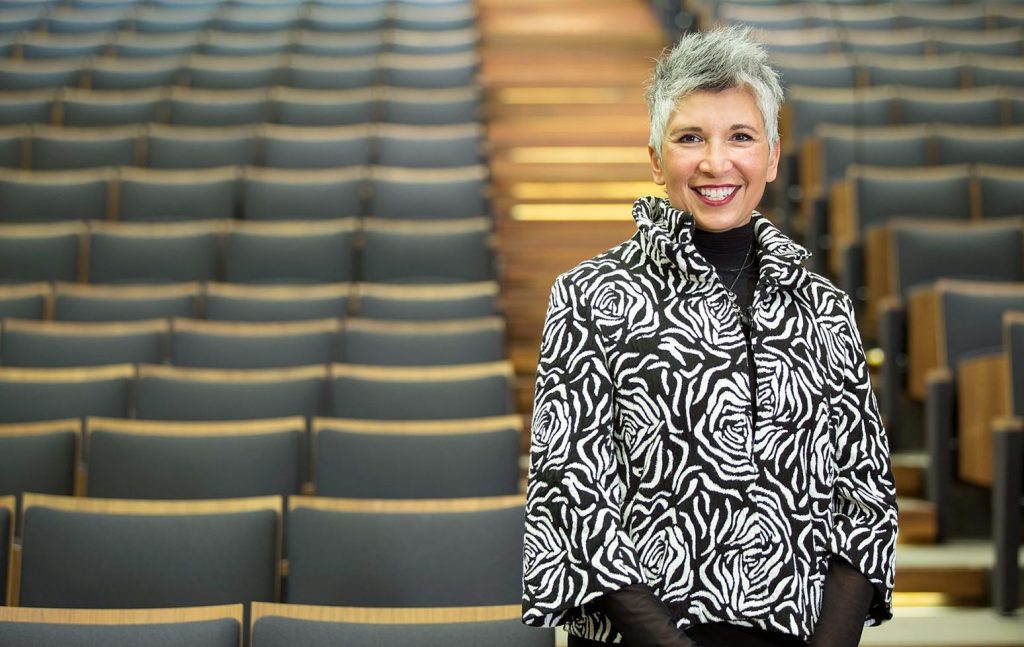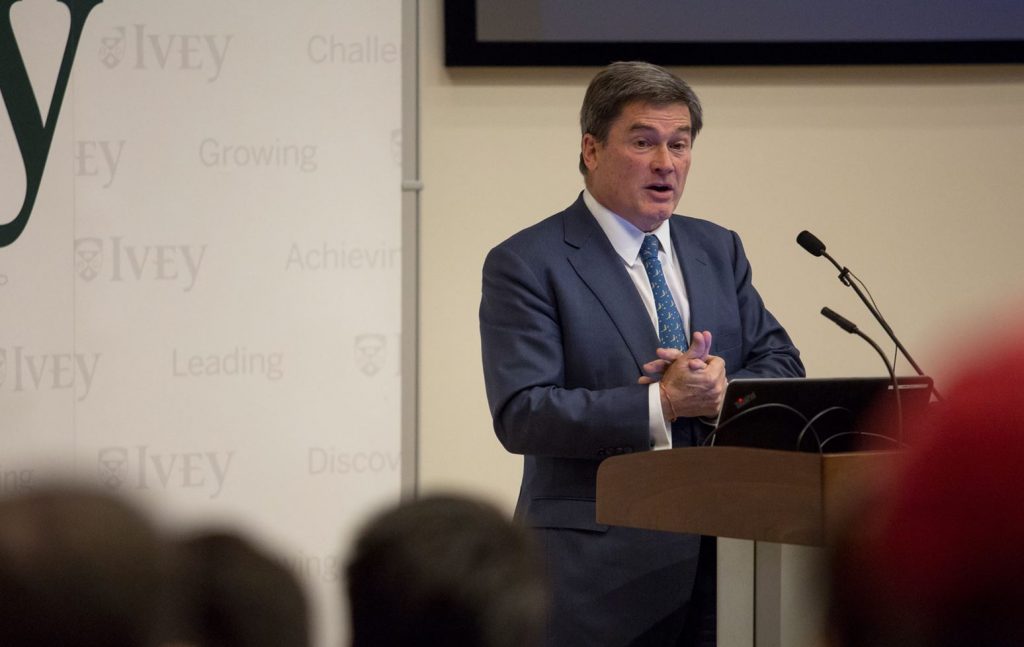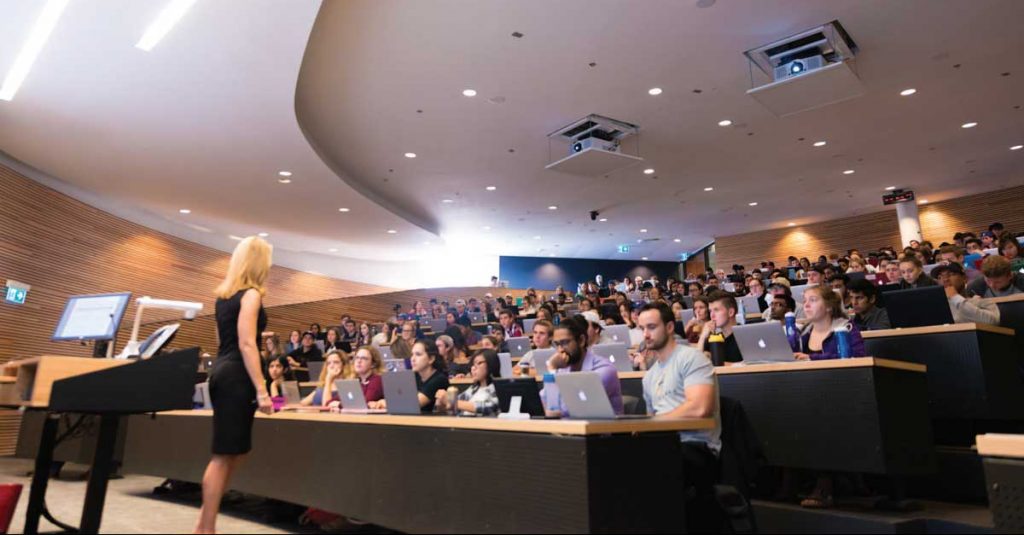Ivey Professor Honored, and More – Toronto News

Professors from some of the Toronto metro’s finest business schools have littered (definitely not literally, in the case of environmental education pioneer Tima Bansal) news headlines this week. Let’s take a look at some of the highlights.
Ivey Professor Tima Bansal Honored for Innovative Teaching – News@Ivey
Tima Bansal, professor at Western University Canada’s Ivey Business School, has been tapped to receive an Ideas Worth Teaching award. During her time as Director of both the Network for Business Sustainability and the Centre for Building Sustainable Value, Dr. Bansal has integrated sustainability into every part of Ivey’s MBA experience.
Where many programs have sustainability electives, Dr. Bansal has elected to co-teach the core MBA courses, so that sustainability practices are not seen as separate from the fundamentals of business education. Bansal was one of 20 winners who will be honored at Working Towards Shared Prosperity: An Academic-Executive Dialogue in Ann Arbor, Michigan this October.

Professor Bansal / Photo via ivey.uwo.ca
Read more about Dr. Bansal’s teaching methods here.
Behavioral Economics Expert at University of Toronto’s Rotman School Receives A Canada Research Chair – EurekAlert!
The Canadian government has announced that Dilip Soman, professor of marketing at University of Toronto’s Rotman School of Management, will serve as the Canada Research Chair in Behavioral Science and Economics. Soman is the Director of Behavioral Economics in Action at Rotman (BEAR), wherein he supervises the use of research findings to help tackle social problems. A recent press release detailed Soman’s work, saying:
“Prof. Soman is a world leading researcher in the area of behavioural economics and its applications to consumer wellbeing, marketing and policy. His work combines insights from psychology and economics to better understand how individuals make decisions.”
As a Canada Research Chair, Soman will have the opportunity to aid in and supervise important research and help train future leaders who show promise.
You can read more about professor Soman here.
How Our Collective Narcissism Explains Everything from Trump and Brexit to China’s Rising Dominance – The Globe and Mail
The Globe and Mail recently released an article that featured research from Russell Belk, a marketing professor at York University’s Schulich School of Business. Belk’s paper, which was published in the Markets, Globalization & Development Review, focused on the theory of “collective narcissism” as it pertains to current world events.
According to Dr. Belk’s work, the nationalistic collective narcissism that led to the Brexit vote in the UK, President Trump’s 2016 election in the United States, and China’s rising global presence is rooted in the belief that others are impeding a nation’s potential for greatness.
“Brexit and the election of Trump both relied on a particular type of nationalistic appeal to collective narcissism—an exaggerated emotional belief that the nation’s greatness is being undermined by other nations and other people. This tendency is catered to by appeals to make the nation great again by shutting borders and embracing isolationism while scapegoating refugees and immigrants. The rise of jingoistic leaders like Trump, Putin, and Erdogan can be explained by such appeals.”
Dr. Belk also explains that China’s move toward globalism is also tied to collective narcissism, as the country is expanding its reach while “rejecting multiculturalism.”
Read more about Dr. Belk’s paper here.
The Best Toronto Business School Internship Opportunities

Toronto is known as one of the major financial centers in North America, and boasts a high concentration of banks and brokerage firms in its bustling Financial District. The city is also home to the Toronto Stock Exchange—the world’s seventh-largest stock exchange by market capitalization.
Rotman Receives $6 Million Endowment, and More – Toronto News

This week, some of Toronto’s most prominent business schools have seen a wealth of exciting news (including actual wealth in Rotman’s case, in the form of a sizeable donation). We’ve rounded up some of the most exciting recent news from Toronto metro’s business schools.
Private Donations Give Specialty Programs a Shot in the Arm – The Globe and Mail
Over 20 years since the University of Toronto received a $15 million donation from the Rotman family, changing its name from the Faculty of Management to the current Rotman School of Management, the philanthropic family once again returned a sizable gift to the Toronto business school.
The new $6 million donation will boost the school’s healthcare management programs, according to the Globe and Mail. As well, the family gifted the school an additional $1 million to help “the reach of an award-winning program for Indigenous entrepreneurs.”
“The latest Rotman family donation is earmarked for three initiatives: recruitment of three faculty research chairs in artificial intelligence, life sciences commercialization and health economics and policy; scholarships for graduate students in health care management studies; and support for a new global executive MBA for health care and life sciences.”
You can learn more about the Rotmans’ donation here.
Schulich Researchers Analyze Canada’s Multicultural Marketplace – yFile
A new York University Schulich School of Business study from professors Ela Veresiu and Markus Giesler—“Beyond Acculturation: Multiculturalism and the Institutional Shaping of an Ethnic Consumer Subject”—found that “that Canada’s market-based form of multiculturalism fosters marketplace inclusion without resource redistribution, and maintains ethnic divides rather than uniting diverse communities.”
“We bring sociological theories of neoliberal governmentality and multiculturalism to bear on an in-depth analysis of the contemporary Canadian marketplace to reveal our concept of market-mediated multiculturation, which we define as an institutional mechanism for attenuating ethnic group conflicts through which immigrant-receiving cultures fetishize strangers and their strangeness in their commodification of differences, and the existence of inequalities between ethnicities is occluded,” said Veresiu.
You can read more about Veresiu and Giesler’s study here.
Investing Insights: Lessons from Tom Russo – Ivey Blog
Last month, Tom Russo, managing member of Pennsylvania investment firm Gardner Russo & Gardner, spoke with professor George Athanassakos’ value investing class at the Ivey Business School about his company’s investment philosophy, which broke down into three principles.

Gardner Russo & Gardner managing member Tom Russo / Photo via ivey.uwo.ca
- The capacity to invest
- The capacity to suffer
- The capacity do nothing
“Despite the long-term unattractiveness of holding cash, doing nothing may sometimes prove to be the right decision to make,” HBA and Computer Science dual degree candidate Leroi Yu writes on the Ivey Business School blog. Sitting on the sidelines instead of compromising on quality takes character. It provides optionality and may prove to be beneficial in the long-run.”
You can read more about Russo’s advice here.
‘Shark Tank’s’ Mr. Wonderful Talks About MBAs, and More – Toronto News

Take a look at some of the top stories coming out of the Toronto business schools this week.
Kevin O’Leary: Here’s How Much an MBA Matters in Business – CNBC
Kevin O’Leary may be one of the most successful businessmen in Canada now, but when he graduated from the University of Waterloo in 1977, he struggled to even land an entry-level job. After two years of frustration and rejection, O’Leary decided to pursue an MBA at Western University Canada’s Ivey Business School. The business giant, known on ABC’s Shark Tank as “Mr. Wonderful,” sees his decision to enroll at Ivey as a turning point in his life.
“The real value of an education is who you meet while you’re getting it,” O’Leary said in an interview with CNBC. “Think about that if you’re in college right now.”
“‘The great thing about an MBA is not the technical skills you’ve learned—because frankly, to be honest with you, I forgot all of those—it was the people I met in my class,’ O’Leary explains.
‘Where are they now? Running banks, they’re industrialists, they’re venture capitalists, they’re investors, they’re all around the world,’ he says. ‘I can pick up the phone and say, ‘Hi. Mr. Wonderful here, let’s talk about a business idea.'”
You can read more about O’Leary’s education and success here.
Bank of Canada Fellowship for Rotman School Professor Renewed for Second Term – EurekAlert!
In 2013, Peter Christoffersen, professor of finance at the University of Toronto’s Rotman School of Management was awarded the Bank of Canada Fellowship, which was recently renewed. The Fellowship Award goes to academics whose research provides insight in areas essential to the bank. Christoffersen has been committed to researching new technology and its effects and potential in the finance realm.
“The Bank is pleased to renew its support for Professor Christofferesen’s work,” said Governor Stephen S. Poloz. “He is helping to shed light on some important issues facing Canada’s financial industry.”
Learn more about Christoffersen and the Bank of Canada Fellowship Award here.
Schulich Students Win Developers’ Den Competition – RemiNetwork
Two groups of students from York University’s Schulich School of Business placed in the top three in this year’s Developers’ Den international case competition. The winning team was made up of four students from Schulich’s Master in Real Estate and Infrastructure (MREI) program: Derek Wei, Jordan Trinder, Alannah Bird, and Bao Nguyen. The competition, which took place on March 23rd, is in its eighth year.
“The Developers’ Den competition provides an important opportunity for the best students to develop and showcase their analytical, creative and presentation skills as emerging talent in front of leaders within the real property sector,” said Jim Clayton, who was recently appointed to the Timothy R. Price Chair at Schulich’s Brookfield Centre in Real Estate and Infrastructure. “We are grateful for the tremendous support the competition receives from industry and alumni.”
Check out more about the competition here.
Rotman Prof Talks Theranos Fraud, and More – Toronto News

People affiliated with Toronto‘s finest business schools have been making the news. Below, we’ve laid out some of this week’s highlights.
How Board Diversity Might Have Prevented the Theranos Fiasco – The Globe & Mail
Andras Tilcsik, Canada Research Chair in strategy, organizations, and society at the University of Toronto’s Rotman School of Management coauthored an opinion piece in The Globe & Mail with Chris Clearfield, Principal at System Logic. The article addressed the fraud charges lodged against Theranos founder Elizabeth Holmes.
Holmes, who was listed as one of Forbes’ “Youngest Self-Made Billionaires” has been charged with “massive” fraud involving upwards of $700 million USD. Holmes has agreed to cede control of her company, which was boating more innovated methods of blood-testing to potential investors.
Tilcsik and Clearfield argue that Holmes’s mistakes might have been prevented had a systemic problem in businesses been addressed at Theranos: board diversity. All but two Theranos board members were white men over 60. According to the article, “… lab experiments show that while homogeneous groups do less well on complex tasks, they report feeling more confident about their decisions.”

Holmes’ equity stake in Theranos, the notorious blood-testing startup she founded, has been reduced to virtually nothing after being charged with large-scale fraud from the SEC.
Learn more about the importance of board diversity here.
YouTube Star Choreographs a Career Blending Bollywood and Business – The Globe & Mail
Shareen Ladha, graduate of York University’s Schulich School of Business, used her MBA to guide her in an unconventional career goal. She wanted to build success producing and dancing in Bollywood-esq videos on YouTube, achieving massive momentum when she did a Bollywood-style remix of Justin Bieber’s “Sorry.” The video quickly went viral, and now Ladha balances making YouTube videos with her career as a senior strategist with McCann.
“Through my MBA, I decided that this was the thing that made me unique and it was proof I could bring a creative aspect to strategy and consulting,” Ladha said in a recent profile with the Globe & Mail.
“It started getting woven into my daily life and daily conversations I would have with people. All my social media accounts were public, so if they ever looked me up or were friends with me, they’d know about it. There was such a positive response.”
You can read more about the YouTube star here.
Ivey Students Learn the Three Gs of Good Investing – News@Ivey
Multi-billion dollar Brazilian investment firm 3G Capital Management recently let students at the Ivey Business School at Western University Canada in on a simple secret: the three Gs to successful investing are “good business, good management, and good price.”
3G managing partner Pavel Begun spoke with professor George Athanassakos and his value investing class last month, further explaining what each of those three Gs (get it?) meant:
Good Business:
“’We define good business as one that is competitively entrenched, generates high return of invested capital and is in solid financial shape.’” Specifically, 3G looks at businesses that are industry leaders and show industry longevity in order to predict their future value. They also look to businesses that generate with ROEs, or return on equity, of 15 per cent and above. Finally, they look at the debt payback period of business to ensure it is no greater than three to five years, helping to determine their financial shape.”
To read the rest of the advice gifted from Begun, click here.
What Toronto MBA Can You Earn in the Least Amount of Time? – MetroMBA
Several of the most well-regarded business schools in Toronto offer MBA programs that do not take the typical two-years that a traditional full-time degree often requires.
For instance, the DeGroote School of Business at McMaster University has an accelerated program that takes just eight months to complete. Alanna Shaffer further explains:
“By exempting students from the required first year MBA courses, students can earn their degree quickly while also cutting their overall tuition expenses in half and accelerating their path to employment. The program is designed for students who have earned their undergraduate business degree in the last ten years, and have at least one year of professional experience. Students may start the program in either September or January.”
Check up on the rest of the fastest MBA programs in Toronto here.
What Toronto MBA Can You Earn in the Least Amount of Time?

It’s easy to see why earning an MBA could be a huge boost to your career—but if the thought of putting those things on hold for two years while pursuing your degree is a source of great anxiety, you are not alone. Many who might otherwise have the ambition and skills to thrive in an MBA program may simply not have the option of putting their life on hold for two years and enrolling in school full-time. This can mean that many talented and driven individuals won’t have access to the kind of opportunities for advancement and growth that an MBA provides.
Not every MBA program requires two years of full-time work. But part-time and weekend programs can often have the opposite problem for individuals eager to earn their degree and reap its benefits. While such programs allow students to continue working full time while earning their degree, they can often take up to three years or more to complete.
For individuals driven to earn their degree quickly, there are a number of programs that allow students to earn an MBA in under one year, reducing the amount of time without an income and moving allowing for a quick path to the salary increase and advancement opportunities an advanced degree is likely to offer.
In Toronto, many top business schools offer accelerated or abridged versions of their MBA programs that can be completed in as little as eight months.
The Fastest Toronto MBA Programs
Ivey Business School – Western University Canada
The Accelerated MBA at the Ivey Business School is available for students who have recently graduated from Ivey’s HBA program, allowing students to earn their degree in just eight months—without needing to take the GMAT exam. This makes it not only among the fastest Toronto MBA programs you can find, but also among the most unique.
The program takes place over the course of eight months, building on the base of knowledge earned during the HBA program. The courses are designed to refresh students on business fundamentals, while also providing career-centered electives in fields like marketing, finance, entrepreneurship, and more. The program also allows students to pursue study abroad through an optional trip to China, South East Asia, or South America.
The benefits of Ivey’s Accelerated MBA are evident for graduates: 97 percent of students earned an offer of employment by within three months of graduating, reporting an average post-graduate salary of $107,116. About 65 percent of employment offers were also facilitated by the university, demonstrating the indelible benefits of the connections made while in school.
DeGroote School of Business – McMaster University
The DeGroote School of Business at McMaster University also offers an Accelerated MBA for students graduating from a Canadian university with their undergraduate degree in business. Attending full-time, the program can be completed in as few as eight months, making it one of the most time-efficient MBAs available to students in Canada.
By exempting students from the required first year MBA courses, students can earn their degree quickly while also cutting their overall tuition expenses in half and accelerating their path to employment. The program is designed for students who have earned their undergraduate business degree in the last ten years, and have at least one year of professional experience. Students may start the program in either September or January.
Wilfrid Laurier University – Lazaridis School of Business & Economics (Toronto Campus)
The One-Year MBA at Wilfrid Laurier’s Lazaridis School of Business & Economics is a unique program that immerses students fully in an integrated model of business education, asking students to constantly make use of the knowledge gained during the program through team projects, case study analysis, and as consultants for a real business. The degree is designed for graduates from any four-year university with at least two years of professional work experience.

Wilfrid Laurier University also offers one of the fastest MBAs you can earn in Canada, with the One Year Lazaridis School of Business & Economics MBA.
The Lazaridis MBA can be completed in just twelve months, offering one of the best return on investments of any Canadian MBA program. Located in Waterloo, a center of technology and finance within Canada, the One-Year MBA also allows students to choose from over 10 different MBA concentrations, such as entrepreneurship, strategic management, supply chain management, and organizational behavior.
Schulich School of Business – York University
The Schulich School of Business‘ Accelerated MBA allows students to bypass many of the Year 1 MBA requirements, cutting the time it takes to complete the degree by half. The program can be pursued either on a full-time or part-time basis, and can be completed within just eight months with the full-time option. The program is reserved for students who have earned a BBA or BCom degree in Canada within the past ten years. With 89 percent of all Schulich MBA students earning a job offer within three months of graduation from their respective programs, the Accelerated MBA gives students the chance to join the workforce much sooner and quickly reap the benefits of their education.
Rotman School of Management – University of Toronto
For prospective MBAs with several years of professional or managerial experience, another way to quickly earn an MBA is by pursuing an Executive MBA, designed specifically for senior managers and executives. Executive MBA programs, such as the One-Year EMBA at the University of Toronto’s Rotman School of Management, can typically be earned in 13 months or less and are designed to accommodate the schedule of a busy professional. While executive programs typically cost more than other MBA variations, the Rotman One-Year MBA stands out as the fastest EMBA you can earn in the Toronto metro.
